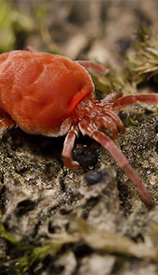Overview
Scratch scratch…shake shake…. If your cat is doing this constantly, or if you smell something less than pleasant coming from his or her ears, the culprit may be ear mites—the most common type of mites that cats get. Ear mites look like miniscule crabs. Their preferred environment is your cat’s ear canal, although once in a great while they venture out of the ear, moving to the head and body.
What’s particularly unpleasant about these little crab-like mites is what they eat: namely, your cat! They love to feed on the tissue debris and fluids inside the ear canal—ICK!
Ear mites are most commonly found in kittens and cats that have poor immune systems (and they can also be found in dogs). They have a three-week life cycle and reproduce rapidly.
Symptoms
 So, what will you see if your feline friend is plagued with these nasty microscopic mites?
So, what will you see if your feline friend is plagued with these nasty microscopic mites?
Symptoms include:
- Scratching
- Increased earwax
- Thick, black-colored ear discharge
- Head shaking
- Sores around or on the ears
- Itching of the head and neck
Diagnosis & Treatment
Your veterinarian will perform a thorough physical on your cat or kitten, paying close attention to the ears. The veterinarian will want to know if your spends time outdoors, with the possibility of being exposed to other animals, especially other cats. Additionally, it is important to relate if your cat has recently spent time in a boarding facility or other environment where there is regular contact with other animals.
Diagnostic tests that your veterinarian will likely suggest include:
- Ear swab and microscopic evaluation to identify the presence of the mites
- Visual inspection of the ear canal with an otoscope
- A feline leukemia virus (FeLV)test
- A feline immunodeficiency virus (FIV) test
- Other routine laboratory tests such as blood work, a chemistry profile, and electrolytes to screen for organ function and infection, especially if your cat is in poor body condition or lethargic
- Fecal tests to rule out other parasites
Treatment
Your veterinarian may clean your cat’s ears while he or she is there for her exam. Most likely, a prescription will be written for parasiticides that will kill the mites, as well as an ear cleaner to keep the ear canal clean of debris.
Prevention
Keeping your pet’s ears clean is the best defense against ear mites. Check them often, and if you have any questions, contact your veterinarian, the best resource for information about the health and well-being of your best friend.
If you have any questions or concerns, you should always visit or call your veterinarian – they are your best resource to ensure the health and well-being of your pets.
| Beware the Bug More about mites Sarcoptic Mange in Dogs Or learn more about dogs and parasites > |

